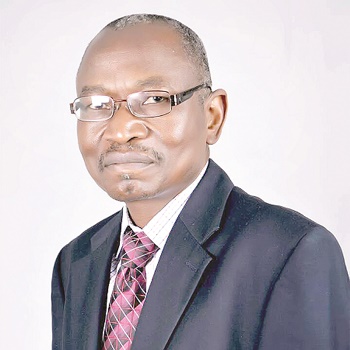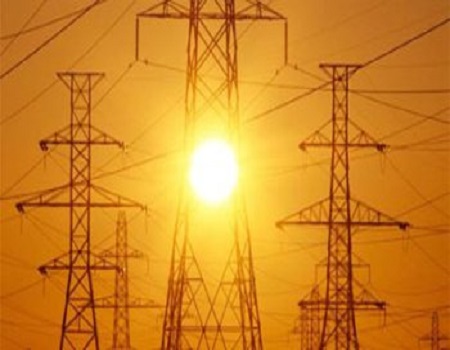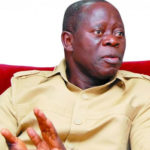Being a value chain with its key players comprising the generation, transmission and distribution licensees, the Nigerian power sector is undoubtedly hailing and failing the almost 200 million Nigerians most of whom are young and gifted with transformational ideas but seem to lack the needed economic-friendly environment to bring their groundbreaking business ideas to fruition and largely contribute towards the advancement of the country’s economy.
Lekan Adelakun is not orphaned, but his living condition replicates those without parents. Having been raised out of penury by his aged parents, Lekan learnt painting and paint-making as there was no money to proceed to the university after completing his secondary education. Like his father, Lekan had always embraced hard work since his primary school days. With the little money he earned from one of the painting work he did for few clients, the young man was able to conceptualize and register his firm with the Corporate Affairs Commission (CAC) in 2018 as he was told that he wouldn’t be able to get corporate patronage without being registered. Two months after registering his enterprise, a particular paint-trading firm in Ibadan contacted him to supply close to 200 medium-bucket paints after his relentless submission of proposals. He was given part payment to get the full payment after delivering the paints.
Being a large scale production, Lekan decided to employ the use of mini industrial machine in the making of the paints. His low financial capacity forced him to rent one of the machines from the factory where he learnt the skill. He had hoped there would be stable electricity from 8pm and beyond at Eleyele area of Ibadan where he resides as it has been customary. But the unpredictability of electricity in Nigeria dealt him a big blow. Though electricity was supplied, it went off less than an hour after he had already started production. Unfortunately, the electricity was not restored and this threw him in misery all night as most of the chemicals and substances he had bought for processing got spoilt. He was nearly moved to tears when he was recounting this ugly experience to Nigerian Tribune. Though he rented high voltage generator to work the following day and deliver the job before deadline, the power outage cost him heavily and greatly slashed the profit he would have made on the job.
“Even before and after delivering the job order, inconsistency of electricity supply continues to affect my business majorly because mid-scale production of paints requires an automated process of manufacturing. Most times, the dearth of stable electricity does not allow me to use essential machines like the pigment dispersing machine and the electric mixer among others to produce paints. I hope the government can help us look into this frequent outage of power because it is frustrating SMEs like mine,” the young man added.
Cognisant of the fact that the provision of effective power supply is key to the growth of any economy, the Federal Government of Nigeria took a bold step by privatizing the country’s power sector in 2014 hoping the change of ownership would rescue the sector from the abyss of misery that had strangled economic growth and worsened Nigerians’ standard of living with only a pitiable 4000 Megawatts of power. But almost six years later, the privatization exercise appears to have had thin effect as the utilized megawatts has reduced to a miserable 3500 MW while the list of hurdles confronting the sector keeps growing.
“The GENCOs currently have an available capacity of about 8,000 MW with an installed capacity of over 13,000 MW, sadly only 3500 MW of this capacity is utilized, due to transmission and distribution constraints. Security and reliability of supply of the available megawatts is another kettle of fish as the transmission and distribution networks trade blame as to who takes and does not take load made available by the generating companies. Poor utilization of available capacities with only about 50 per cent utilised,” said Dr. Joy Ogaji, the Executive Secretary of the Association of Power Generation Companies (APGC), in an interview with Nigeria Tribune at the weekend.
She said the inability of the Transmission Company of Nigeria (TCN) to adequately manage the grid has effectively threatened the effectiveness of the power sector, adding that though the TCN claims it has a wheeling capacity of about 8000 MW, there is arguably no proof for this while the TCN reports of huge investments in improving the systems seem to be a myth especially against the background of the system outages with year 2019 recording no fewer than 11 collapses of the nation’s power grid.
She stressed that interestingly, the TCN has blamed the grid collapses on the load rejection by the Electricity Distribution Companies (DisCos) which, she said, could be mostly attributed to the capacity and technical constraints faced by the distribution companies as well as commercial considerations even though the DisCos claim that the transmission company drops load in areas where they do not want.
“The DisCo networks and equipment are ageing, overloaded and fragile. Again, the DisCos, since taking over the distribution assets, have not made any substantial investments in the networks/infrastructure. They have blamed their poor performance on the absence of a cost-reflective tariff which has prevented them from recouping their investments. They have complained of vandalism of their electricity equipment, energy theft and by-pass by consumers and non-payment for services by customers which have hampered their revenue collection efficiency,” she added.
Corroborating Dr Ogaji’s claim on the apparent constraints limiting the effectiveness and productivity of the distribution companies across the country, the Chief Operating Officer of the Ibadan Electricity Distribution Company (IBEDC), Engr. John Ayodele, said: “One of the challenges confronting us is infrastructural deficiency under which there are lots of sub-set; the second one is funding which is as a result of many other factors. Taking the funding for example, we sell electricity and we expect to collect what we sell. If you look at the way the tariff is structured, you will discover that it is not the same across all the states because of the level of cross-subsidization required between tariff classes.
“In IBEDC, for instance, we have almost 62 per cent residential customers in terms of the energy consumed. The energy paid by residential consumers is not even sufficient enough for us to pay what we have to pay NBET and market operators. For every electricity product we sell to the people in the residential area, we are losing more. The tariff class where they belong is not sufficient to recover the cost. So what the NERC normally does is that the people on commercial and industrial pay more than what it costs us. So, it is from the payment they make, that we cross-subsidize for customers on residential who cost us a lot by not paying up their bills. For example, last month, our electricity bill from NBET and MOs was about N8billion and we collected N5.3billion. This showed that N2.7billion is a deficit which we carry every month. From day one that we set up, we have been carrying deficit because there is a tariff short fall as a result of not allowing us to charge tariff equivalent to what will bring about the returns that we need to survive.”

Human capital deficit, decaying infrastructure grounding DisCos
Speaking further, the IBEDC chief said, “Also, we have manpower or workforce related problem because if you look at our universities today, they are offering only electronic and electrical engineering. But electronics has no basis where we are. If you don’t do power engineering, you are not very useful to the industry. But how many students do power engineering, it is just 5 per cent of graduates out there. So, there is human capital deficit in the system. And of course, the infrastructure is decaying by the day as after 10 years, the life span of most equipment is almost gone. Most of Nigeria’s current transformers can’t spend up to five years before they pack up. So all these things compound the problems of the DisCos and they are all based on the fact that there are not enough funds to address their deficits.
“When we took over this asset, many of the work stations spanning over $200 billion worth of equipment were all in ramshackle position. So, we need fund to address each and we are doing a lot. In fact, we have changed the equipment at about 33 of our workstations but we need money to continue in that case. In a nutshell, the problem is multi-facetted; regulatory issues, funding issues and you have a lot of people who don’t want to pay for electricity. Almost 46 per cent of our residential customers will not pay for electricity no matter what you do to them; some don’t even have the capacity to pay. So, people are not paying while others are by-passing. This is not limited to the poor people alone as even the rich too don’t pay. Also, federal government and state governments are not paying as and when due, including the MDAs, who currently owe us over N2.4billion, not to talk of teaching hospitals that will not pay. So, these are the problems and they all lead to funding.”
Meanwhile, as pitiable as the condition of most of the distribution companies might be, Dr Ogaji sees their poor remittance to the market as a serious challenge which, she argued, weighs the sector down by an excruciating liquidity crisis.
She said the GenCos are owed over a trillion naira while the regulatory agency for the power sector in the country, the Nigerian Electricity Regulatory Commission (NERC) “has failed to perform up to par in executing its regulatory responsibilities.”
She added, “Again the operational and technical impediment of the commission is a contributing factor. The regulators do not seem to know or understand their role and consequently, it has not been awake to the obligations. By virtue of Section 62(7) and 75 of ESPRA, NERC is empowered to discipline or penalize any licensee that is contravening or violating the terms and a condition of its license, a role that the commission has continuously proven that it lacks the will power to dispense. The laxity on the part of the commission till date has only helped to increase the gross indiscipline in the sector.”
Other challenges which she believes are grounding the power sector include lack of effective monitoring and evaluation mechanism in the sector, paucity of data, poor implementation and enforcement of policies and regulations, lack of transparency and lack of sector governance, among others.
She observed that all thermal and hydro power plants are designed to operate optimally and efficiently at base load, stressing that operating the plants outside base load conditions could lead to a reduction in efficiency with implications for an increase in consumption of gas for thermal plants by as much as 15-20 per cent as extra cost is not recognized by NBET nor captured in the MYTO.
“The damaging effects include: thermal stress on steam turbine blades, creep of compressor and turbine blades, Cracks on exhaust sleeves, Irregular heating and cooling cycles of hot gas path components, Cracks in ceramic tiles of, the combustion chamber, defective gas control valves due to wear and tear etc.,” she said.

How NERC can stem the tide
While explaining how the Nigerian Electricity Regulatory Commission (NERC) can deliver results and ensure private investors in the sector get dividend on their investment while there is stable electricity for all, Dr Ogaji urged the commission to address issues regarding the enforcement and implementation of its policies, adding that mechanisms should also be put in place for monitoring and evaluation of the performance of the licensees to ensure they are adhering to the terms of their license
“There is need for NERC to enforce market discipline. By virtue of S. 62(7) and 75 of ESPRA, NERC is empowered to discipline or penalize any licensee that is contravening or violating the terms and conditions of its license, a role that the commission has failed in and as a result, what you see in the sector presently is the licensees behaving as they like. This has to be addressed.”
She further attributed the intermittent collapse of the country’s power grid to system disturbances along the transmission grid, which, she said, could include a huge drop of load from a sub-station that would cause instability in the grid, stressing that this could be solved in most cases with adequate spinning reserve in place.
Another cause of grid collapse, she highlighted, is load rejection. In this case, she said where an electricity allocation of load is being rejected; it overloads the distribution lines, thereby leading to grid collapse.
“Obsolete substation equipment can also result in grid collapse. Such equipment leads to several electrical malfunctions, which get to the grid as part of it and causes the whole network collapse. Poor operation and maintenance, and natural disasters can also play a role in this,” she further submitted.
Speaking on the effect of poor electricity supply on the economy, the Lagos Chamber of Commerce and Industry (LCCI) called for a holistic reform of the sector.
In a statement signed by the Director General, Muda Yusuf, the body said the sector “is one area in which the trend since independence has been that of progressive decline. The power supply has consistently lagged behind the pace of economic activities and population growth. This development impacted negatively on investment over the past few decades with increased expenditure on diesel and petrol by enterprises. This also comes with the consequences of declining productivity and competitiveness.”






